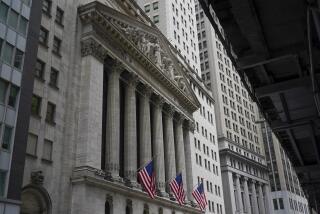As the Big Board Goes Public, Many on Wall Street Predict Strong Demand
- Share via
NEW YORK — Wall Street has watched thousands of companies go public over the years. Today, its oldest institution -- the New York Stock Exchange -- gets its turn, with shares being offered to investors for the first time.
Many are betting that NYSE stock will get off to a strong start, pointing to expected demand from individual investors and to the run-up in shares at similar exchanges that have gone public recently.
CBOT Holdings Inc., parent of the Chicago Board of Trade, which specializes in futures contracts, went public at $54 a share in October and closed Tuesday at $121.50. The Intercontinental Exchange Inc., an Atlanta-based energy-trading market, closed at $60 after debuting at $26 in November.
And shares of Archipelago Holdings Inc. have more than tripled since the NYSE announced last April that it would buy its electronic-trading rival and form a new company that begins trading today under the symbol NYX.
Archipelago shares fell $2.87 to $64.25 on their final day of trading.
“There’s an awful lot of excitement about exchange stocks,” said Jamie Selway, managing director of New York institutional brokerage firm White Cap Trading. Exchanges of all kinds are benefiting as money managers pursue options trading and other complex tactics to build their portfolios, Selway said.
At the NYSE, the Archipelago acquisition will pave the way for more computerized trading, which is expected to bring the Big Board more business from hedge funds and others that put a premium on high-speed trades.
Investors also are betting that the new NYSE Group Inc. will expand aggressively by acquiring other securities exchanges and by branching into areas such as bonds and derivatives. They also expect profits to be goosed by significant cost cutting.
But prospective NYSE investors must be careful because the exchange faces tough rivals and uncertain prospects for expanding beyond its core stock-trading business, analysts say.
The Big Board faces brutal competition for trading volume and stock listings from the Nasdaq Stock Market, its longtime nemesis which has recently introduced several initiatives to steal business from the NYSE.
“The market appears to ignore the risks of a potential price war” between the NYSE and Nasdaq that could sap profits at both companies, according to a report from independent stock researcher Majestic Research Corp. in New York.
In the weeks before its acquisition by the NYSE, half of the six analysts who followed Archipelago had “sell” ratings on the stock, and the rest had “hold” ratings, according to Bloomberg News. In essence, these analysts believe the benefits of the NYSE-Archipelago marriage have largely been realized in Archipelago’s stock price.
The Big Board also must deal with regional stock exchanges, which are bulking up from recent cash infusions from big investment banks. The banks, worried that the NYSE and Nasdaq could form a duopoly and raise trading fees, are hedging their bets by investing in alternative trading venues.
After hovering for years around 80%, the exchange’s market share of trading in NYSE-listed companies slipped to 71.7% in January, according to NYSE data. That could fall below 60% even with the addition of Archipelago, said Michael Vinciquerra, an analyst at Raymond James & Associates.
Supporters say the NYSE will remain a dominant player even with a falling market share.
“How many Fortune 1000 companies can say they have 80%, 70% or even 60% market share in their businesses?” asked George Rodriguez, a former NYSE staffer who is now a managing director at TradeTrek Securities, an institutional brokerage in Newark, N.J. “That’s a very enviable position to be in.”
In another significant challenge, the NYSE also must fuse its floor-based trading model with Archipelago’s automated system.
That’s a logistical and political challenge since some floor traders worry that encroaching technology could make them dispensable.
The exchange also must implement a “hybrid” electronic trading system this summer to comply with new Securities and Exchange Commission regulations.
“They’re going to have a lot of challenges” in the next few months, Vinciquerra said.
More to Read
Inside the business of entertainment
The Wide Shot brings you news, analysis and insights on everything from streaming wars to production — and what it all means for the future.
You may occasionally receive promotional content from the Los Angeles Times.









